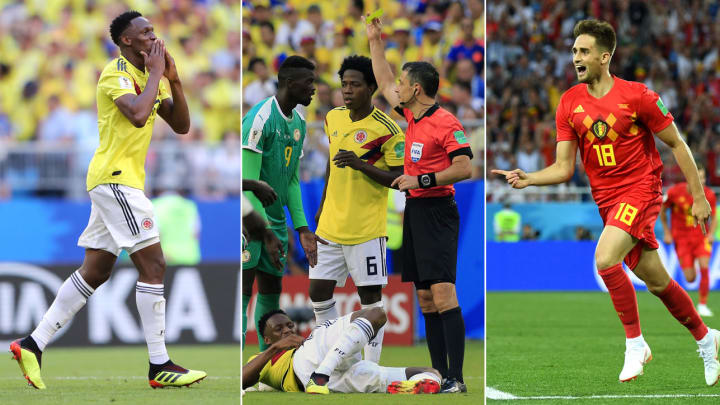World Cup Group Stage Ends With All Eyes on Fair Play, Unusual Battle for First

MOSCOW — Day 15 of World Cup 2018 saw the end of the group stage and another dramatic set of simultaneous group finales. Colombia and Japan advanced and Senegal was out in Group H after fair-play points was used a tiebreaker favoring the Japanese. And in Group G, Belgium beat England 1-0 to win the group and advance to the tougher side of the knockout bracket, while Tunisia exited on a high note, coming from behind to beat Panama 2-1.
Here are my five thoughts as the group stage ends, setting the stage for what should be a thrilling road to the title:
— Brian Straus (@BrianStraus) June 28, 2018
• There’s got to be a better way than using fair-play points as a tiebreaker
For the first time in World Cup history, fair-play points (yellow and red cards) were used to break a tie in a group. That meant Senegal was out and Japan was in after they both finished even on points, goal difference, goals scored and head-to-head in Group H. It very nearly happened again in Group G, until Adnan Januzaj gave Belgium its lead over England.
Look, every team knew the rules coming in. But fair-play points are based on the subjective views of officiating crews, and if you have ever heard the language used to describe African teams—pace and power, etc.—you’re left wondering if referees might subconsciously give more cards to African teams than others. (I’d love to see the data on this over a long-term period.) In any case, I would rather see shots on goal or expected goals used as a tiebreaker than fair-play points. That would at least reward attacking play.
England's New Three Lions Appear to Be a Different Animal at This World Cup
• No African teams made the knockout stage
For the first time since the tournament went to its modern round of 16 knockout round format in 1986, not a single African team advanced from the group stage. Yes, we saw good soccer from Senegal, Nigeria and Morocco, but the results weren’t good enough, and questions need to be asked about why African soccer has yet to reach its full potential at the World Cup. We heard in the 1990s from people like Pelé that an African team would soon win the World Cup, but here we are in 2018 and an African team has yet to even make the semifinals in a World Cup. There’s too much talent and skill in Africa for this to continue, and I blame the federations for squandering the opportunity.
• Belgium surprised by trying to score
I thought we were going to get another France-vs-Denmark scoreless borefest between Belgium and England, neither of whom particularly wanted to win Group G, considering the second-place team would go, presumably, to the easier half of the knockout bracket. But Januzaj is never one to pass up the chance to show his stuff, and he scored a terrific second-half goal to give Belgium the victory and nine points in the group.
If you want to win a World Cup, you should have the confidence that you can beat any team in your path. So if that means Belgium has to beat some harder teams, so be it. I like their confidence.
Arrogant Germany Accepts Its Shocking, Deserved World Cup Elimination
• It's incredible that Japan made six lineup changes
In a game that mattered in a huge way, it was stunning that Japan coach Akira Nishino made six changes, including benching every Japanese goal-scorer in this tournament. The move nearly backfired when Japan lost 1-0 to Poland, but Colombia did the Japanese a huge favor by beating Senegal 1-0 to knock out the Senegalese and put Japan in the round of 16. Japan also got some grief for finishing its game just knocking the ball back and forth in the real-life version of the famous scene from The Simpsons (“midfielder holds it … holds it … holds it”).
But I have no problem with Japan doing that, since they earned the right by grabbing four points in their first two games.
Brazil Hopes Its World Cup Crescendo Continues Into Brutal Knockout Stage Road
• My pick to win it all is in good shape
In the end, I didn’t do too badly, picking 13 of the 16 teams that reached the knockout stage. The three teams I missed on were Iceland (Argentina got there instead), Germany (Sweden instead) and Senegal (Japan instead)—and all three were alive to advance until the final minutes of their group finales. But my pick to win the tournament, Spain, is still alive, and the Spaniards happen to be on the far weaker side of the knockout bracket. We’re in for some more surprises no doubt, but I can hang my hat on this.
Grant Wahl has covered soccer for 22 years at Sports Illustrated. His new book, Masters of Modern Soccer, details the craft of soccer position by position. You can order it here.

A leading soccer journalist and best-selling author, Grant Wahl has been with SI since 1996 and has penned more than three dozen cover stories.